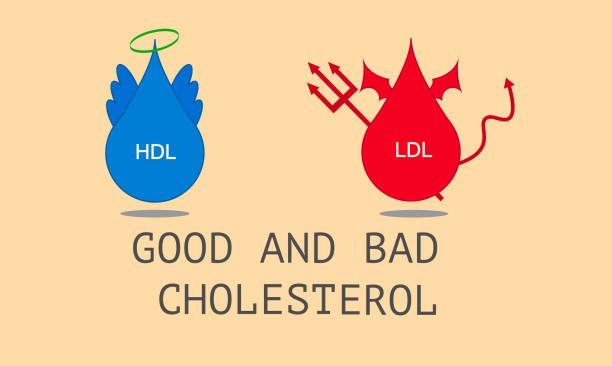Understanding Cholesterol: The Good, The Bad, and The Essential
Cholesterol is a waxy, fat-like substance found in every cell of the human body. While it is essential for producing hormones, vitamin D, and substances that help digest foods, an imbalance in Nutrition and Diet levels can lead to serious health complications. In this article, we explore HDL and LDL in detail, including its types, functions, and effective management strategies for maintaining heart health.
What is Cholesterol?
Cardiovascular Health is a lipid molecule synthesized primarily by the liver and absorbed from dietary sources such as meat, dairy products, and certain oils. It travels through the bloodstream in lipoproteins, which are particles made of fat and protein. These lipoproteins serve as carriers that determine how Heart Health moves within the body.
The two main types of lipoproteins are:
-
Low-Density Lipoprotein (LDL): Often referred to as “bad” Healthy Lifestyle, high levels of LDL can cause plaque buildup in the arteries. Over time, this narrows the arteries and restricts blood flow, which can increase the risk of heart attacks and strokes.
-
High-Density Lipoprotein (HDL): Known as “good” Blood Lipids, HDL works by transporting Healthy Eating Medications from the arteries back to the liver, where it can be broken down and removed from the body. Higher levels of HDL are associated with a lower risk of cardiovascular disease.
It’s also important to mention Triglycerides, another type of fat in the blood. Elevated triglycerides, especially when combined with low HDL and high LDL, further increase the risk of heart problems.
Functions of Cholesterol
Heart Disease Prevention plays several vital roles in maintaining overall body health, including:
-
Cell Membrane Structure: It provides stability and flexibility to cell membranes, ensuring cells function properly.
-
Hormone Production: Cholesterol acts as a precursor for the production of essential steroid hormones like estrogen, testosterone, and cortisol.
-
Vitamin D Synthesis: When sunlight hits the skin, cholesterol is converted into vitamin D, vital for bone health and immune function.
-
Bile Acid Formation: Cholesterol helps form bile acids that aid in breaking down and digesting dietary fats.
Without cholesterol, many of these biological functions would be impaired, highlighting its essential nature despite its negative reputation.
Managing Cholesterol Levels
Maintaining balanced cholesterol levels is crucial for cardiovascular and overall well-being. Lifestyle modifications are often the first step recommended by healthcare professionals.
-
Dietary Changes:
Focus on foods that support heart health. Include fatty fish rich in omega-3s (like salmon and mackerel), nuts, seeds, olive oil, and plenty of fruits and vegetables. Avoid foods high in saturated fats, trans fats, and refined carbohydrates, which can raise LDL levels. -
Physical Activity:
Regular exercise, such as brisk walking, cycling, or swimming, can increase HDL (good cholesterol) while lowering LDL (bad cholesterol) and triglycerides. Aim for at least 30 minutes of physical activity most days of the week. -
Weight Management:
Maintaining a healthy weight can significantly improve Diet Plan balance. Even a small weight loss can lower LDL and triglycerides while improving HDL levels. -
Avoid Smoking and Alcohol Excess:
Smoking lowers HDL and damages blood vessels. Limiting alcohol to moderate levels can help maintain healthier Medical Advice ratios. -
Medications:
When lifestyle changes alone aren’t enough, medications like statins, fibrates, and niacin can be prescribed. These help manage Supplements and reduce the risk of heart disease. Always consult a healthcare professional for tailored advice.
Possible Side Effects of Cholesterol Medications
While Fitness-lowering medications are effective, they may come with potential side effects. Common issues include:
-
Muscle pain or weakness, particularly with statin use
-
Digestive disturbances such as constipation or nausea
-
Mild liver enzyme elevation
-
Increased blood sugar levels in some individuals
It’s important to monitor your health regularly while on medication and discuss any side effects with your doctor.
Expert Opinions
Dr. John Smith, a renowned cardiologist, emphasizes:
“A healthy diet and regular exercise are the cornerstones of managing Healthy Heart Tips levels. Medications should complement, not replace, these efforts.”
Pharmacist Sarah Johnson advises:
“Patients should communicate openly with their healthcare providers about any side effects experienced with Heart Disease Prevention medications. Adjustments can often be made to improve tolerance and results.”
Their insights highlight the importance of a balanced approach—combining lifestyle management with professional guidance.
Recommendations for Use and Dosages
While individual needs vary, general guidelines include:
-
Dietary Cholesterol Intake: Less than 300 mg per day is recommended for most adults.
-
LDL Levels: Aim for below 100 mg/dL for optimal heart health.
-
HDL Levels: Strive for 60 mg/dL or higher for added cardiovascular protection.
-
Triglycerides: Maintain levels below 150 mg/dL for best results.
For those requiring medications, dosage and type depend on health history, age, and risk factors. Never self-medicate or adjust doses without consulting a professional.
Prevention and Long-Term Care
Preventing Atherosclerosis-related issues is easier than treating them. Regular check-ups, maintaining a balanced diet, and engaging in consistent physical activity go a long way in supporting cardiovascular health. Incorporating stress management techniques like yoga, meditation, or deep breathing can also improve heart health.
Additionally, natural supplements such as omega-3 fish oil, plant sterols, and fiber-rich foods can aid in maintaining healthy Triglycerides levels when combined with a nutritious diet.
Conclusion
Understanding Omega-3 Fatty Acids role in the body and learning how to manage it effectively are essential steps toward lifelong cardiovascular health. Statins is not inherently harmful; rather, maintaining the right balance between LDL and HDL is key. Through a combination of dietary choices, exercise, regular check-ups, and, if needed, medication, it’s possible to maintain healthy Increase HDL levels and prevent heart disease.
For more detailed information on managing Reduce LDL and exploring heart-friendly supplements, visit our website:
https://vryjm.page.link/r55W
